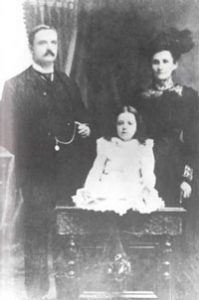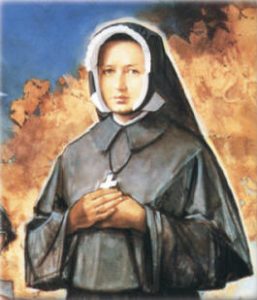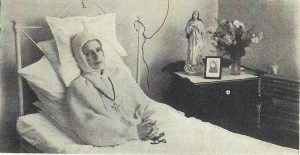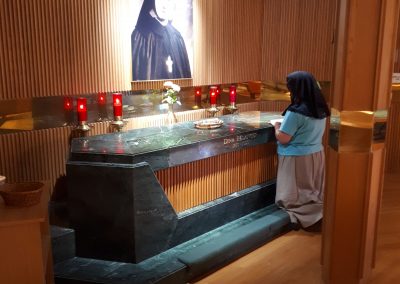Blessed Dina Bélanger
Her childhood
 Dina Bélanger was born in Quebec City on April 30, 1897. As an only child, her parents, of wealthy means, lavished much attention on her, but avoided spoiling her with the wealth of the family home. They were very conscientious in showing her the path that must be followed to remain holy and pure.
Dina Bélanger was born in Quebec City on April 30, 1897. As an only child, her parents, of wealthy means, lavished much attention on her, but avoided spoiling her with the wealth of the family home. They were very conscientious in showing her the path that must be followed to remain holy and pure.
From a young age, she was taught by her parents to stay away from any offense against God, even the most unintentional one. In her early years, Dina often showed a rebellious and obstinate will. However, her parents corrected this bad behavior by their vigilance and firmness. I will understand,” she wrote, “only in Heaven the vigilance, devotion and love of my father and mother. It is one of the greatest favors to be born and live in an atmosphere of peace, union, charity, sublime examples and constant conformity to the good will of Providence.” … “To prove my gratitude to them, I have only one duty – and a very imperious one: to become a saint. It is a sacred debt. Otherwise, I have no filial piety; I do not deserve to be called their child.”
“As soon as my tongue became loose, mother taught me to pray…. The first hymns I remember are, ‘Here he is the Lamb so meek,’ etc., and ‘I put my trust, Virgin, in your help,’ etc…. I was only three years old when mother began to take me to religious ceremonies….”
One day, Dina, aged four, was taken by her mother to a retreat. It was during a novena to St. Francis Xavier. The preacher spoke about hell and the next night, in a dream, Dina saw terrifying demons, red as fire. Dina wrote: “I would like to invent the most miserable epithet to describe them. I was terrified. I consider this dream a great grace. Having such a horrible fear of the devil, it inspired in me an equal hatred for sin, a diabolical suggestion.
Initiation to charity:
Little Dina accompanied her mother on visits to the poor. I accompanied my mother,” she wrote, “on her charity visits. All my life I saw my parents open their hands wide to help the poor […] Their happiness was always to give in silence and secrecy.”
“Mom was my first catechism teacher, assisted by Dad. Answering my thousand ‘whys’, they knew how to report the good to the good God, to tell me about the Blessed Virgin, the angels and the saints.”
Having several religious relatives, Dina often visited religious communities in Montreal with her parents; it was while attending a cousin’s taking of the habit that she first felt the desire to become a religious.
At the age of six, she began her primary education at the Congregation Notre-Dame. At school, Dina applied herself to work and study. Her efforts were rewarded with success. One day, the teacher pointed out to her that there was no saint with the name of Dina. Dina Bélanger said to her: “Well, I will be a saint, I will give a patroness to those who will bear my name.
Her motto: Love and let Jesus and Mary do the rest :
At the age of 13, Dina consecrated herself to the Blessed Virgin according to the devotion of St. Louis-Marie Grignion de Montfort. She used to say: “Love and let Jesus and Mary be”. That is the expression that satisfies me. To love means to love to the point of madness, to the point of martyrdom. To let Jesus do it is the perfect abandonment which supposes the annihilation, the destruction of myself. To let Jesus do it is to let the God of love act freely; to let Mary do it: to blindly entrust to her the care of realizing her Jesus wrapped in the cloak of my outer being.”
At the age of sixteen, she asked her parents for permission to enter the community. Her parents considered her too young and told her to wait. Dina was particularly obedient and complied with the wishes of her parents and her confessor. She writes: “My motto, ‘Rather death than defilement’, seemed to me to be an imperative duty. With my parents so Christian and under their close supervision, I found myself sheltered from danger, everything favored my piety, the environment was most chosen.”
Musical studies:
Since the age of eight, Dina had begun piano lessons at home under the direction of a private teacher. At the age of eleven, she received her first piano diploma. She began to compete in different circumstances. She always received compliments with humility and attributed her success to God. She would say to those who congratulated her, “I thank you, but I don’t deserve it, it was the good Lord who did it and I am only his instrument.”
Her musical studies continued and she soon earned her degree. She says, “This musical work brought me closer to God; I offered each note played as an act of perfect love. My practices often became a meditation, especially when the pieces were slow and somewhat collected in character.”
Toward the end of 1915, her parents and spiritual director decided that Dina would continue her musical studies at the New York Conservatory of Music. During the two years of this course, Dina had two companions who later also entered religious orders. It was a great sacrifice for Dina to leave the security of her family and the care of her beloved parents, but in the spirit of obedience, she went to the United States.
The three young Canadian girls boarded at the convent of the Religious of Jesus Mary. There was a chapel near the entrance of the convent and Dina visited and talked with Jesus in the Blessed Sacrament. She applied herself to study but with a natural prudence and very rarely went out for a walk. Her efforts were always successful. “My divine Master,” she will write, “made me indifferent to the appreciation of others on my account…Jesus did not want me to enjoy my efforts, and he allowed that, by my manner of acting, others could not suppose what was going on in me.”
After two years in the United States, she returned to Quebec City and stayed with her parents for another three years. During the three years before she entered the community, Dina experienced a terrible spiritual trial. All her spiritual exercises became a source of aridity, prayers and meditations were a continual battle against distractions. Despite this, Dina persevered in an intense life of prayer. It was early in this ordeal that she began to hear the voice of Jesus speaking to her in her heart.
One day, when she was wondering what the purpose of her musical work could be, Our Lord answered her: “Your musical knowledge will protect your vocation. But you will do good above all by your writings”.
Reparation for the sacrileges committed against Our Lord and zeal for the salvation of souls became two duties that Dina committed herself to fulfill. Her sufferings and sacrifices led countless souls to Heaven.
Her entry into the community:
 In 1920, while wondering which religious community she should join, she heard Our Lord tell her to join the Congregation of the Ladies of Jesus and Mary. He said to her, “I want you at Jesus and Mary.”
In 1920, while wondering which religious community she should join, she heard Our Lord tell her to join the Congregation of the Ladies of Jesus and Mary. He said to her, “I want you at Jesus and Mary.”
Dina entered the community at the age of twenty-four. She entered the Sisters of Jesus and Mary of Sillery in 1921. Dina’s life as a postulant was extremely difficult; the devil was always trying to discourage her, to turn her away from her vocation. However, her intimate union with Jesus protected her.
After a retreat, while she was a postulant, Dina summed up the plan for her new life in three sentences: “Obey blindly, suffer joyfully and love to the point of martyrdom!” Dina clung to her vocation and often said that returning to the world would be the cruelest suffering. The Mother Superior entrusted Dina with teaching piano to young students and Dina devoted herself to this new task with enthusiasm. She saw the image of God in these young students. When Dina took the religious habit, she took the name of Sister Mary St. Cecilia of Rome, patron saint of musicians.
Consecrated souls:
Throughout her religious life, Our Lord would reveal to her beautiful things about consecrated souls. “I am so sensitive,” Our Lord told her, “to true love, to the disinterested love of consecrated souls, to the love that seeks in everything only my own interests […] I am much more sensitive to the indifferent love of souls consecrated to me than to the sacrileges and criminal profanations of which I am the object of my enemies. I give so many graces and lights to the souls who are consecrated to me!” (c.f. Autobiography, page 411).
Jesus made known to Sister St. Cecilia of Rome how important the bond between souls is, especially for those who are consecrated to Him in religious life. Our Lord called Dina “my little self.” He revealed this to her: “I make you see the whole multitude of consecrated souls until the end of time, to make you understand the influence, even of one soul entirely given over to me, on all the other souls. You see that, through her, my rays extend far and wide, to the extreme limit, that is, I do good until the end of time.”
“I call all consecrated souls to surrender themselves totally to me, to let themselves be filled by me, to let me act freely in them and radiate through them as I want. I call them all. And you see how few there are who refuse me nothing. In all this multitude, in each soul, one should no longer see anything human, but see me, only me. Looking at the consecrated souls, my heavenly Father should recognize and see in each one of them only me. Alas! it is far from that!” Our Lord also said to him, “If you only knew how much my heart is consoled when I find a soul who gives herself totally to me! I find so few!”
“My little wife, listen, listen… listen well… If all the consecrated souls would not refuse me anything, if they would unceasingly let me act freely in them, all the other souls would be saved. Yes, all souls would be saved. My heavenly Father, seeing in consecrated souls only myself, his beloved Son, hearing only my divine voice, could refuse them nothing. Through the voice of consecrated souls, I would pray and beg my heavenly Father to save and sanctify all other souls according to his holy will, and he could not refuse me… I want to continue the redemption with my life in souls. Pray and beg my divine Father. To beg means to pray with urgency, to pray without becoming weary, to pray with the assurance of being heard. Pray and beg!” …(c.f. Autobiography).
“My little spouse, if I see so many souls falling into hell, it is undoubtedly because they want to, but it is also because of the abuse that consecrated souls make of my graces. Pray and beg, through my most holy Mother and through my divine Heart, pray and beg my heavenly Father to save and sanctify all souls. Pray and beg Him to sanctify all consecrated souls. My Heart loves every soul infinitely. During my human and earthly life, I could not do more for the salvation and sanctification of souls; and since then, I want to continue the redemption by my life in souls. Pray and beg my divine Father. To beg means to pray insistently, to pray without getting tired, to pray with the assurance of being heard. Pray and beg.” (c.f. Autobiography).
“The lack of union with Me. Many of my wives too often act on their own, forgetting to apply themselves to union with Me. I cannot bless their prayers or their work as I want, because attachment to their human desires puts an obstacle to the fullness of my graces […] It is necessary to ask me. I give it, my grace, to every soul who asks it of me, and especially to every religious soul who is my spouse and who wants to become one […] Let the soul simply ask me for the grace that I reign in it as I want […] Correspond to it with great love.” (c.f. Autobiography, page 398)
The vocation of priests: “I call them to become other Christs. To be other Myself: that is their vocation”
“Love! Love! I thirst for souls! Many souls are lost because many of my priests do not love me enough. They do not touch hearts because they are not united enough to Me. They rely too much on human means and on their own activity, and not enough on my divine action” (c.f. Autobiography, page 420).
“My priests! I love them so much, and in return, there are so many who seek their enjoyment outside of Me! There are so many who do not know how to love Me! (c.f. Autobiography, page 419).
“The crimes of the world irritate my divine justice less than the sins and deliberate faults of consecrated souls. Ah, my little bride, I have given you all the love of my Heart. Offer my infinite love to my Father to appease his anger and to stop his irritated arm.” (c.f. Autobiography, page 419).
“If I am sad, it is because there are so many consecrated souls who love Me for themselves; it is because there are so many of my priests who seek their personal interests before Mine […] Ah, My little Self, most souls are afraid to love Me for Me. Even a great number of consecrated souls, a great number of my priests fear my divine advances. Too many religious and priestly souls do not understand that the sacrifices I ask of them are flames of love that escape from my Divine Heart to attract and sanctify their human hearts.” (c.f. Autobiography, page 397).
“Offer to my Father, for my priests, the spirit of prayer of my Heart, my spirit of prayer, the perfect union of my Heart with Him. This is what so many of my priests lack, the spirit of prayer, of intense interior life. (c.f. Autobiography, page 385)
“In all religious communities, there are many consecrated souls who do not understand what perfect renunciation is […] Offer to my Father the perfect renunciation of my Heart. You always have there, in my Heart, all that is necessary to make up abundantly for all the failings and all the forgetfulness […] Ah, my little spouse, among consecrated souls even, there are very few who understand the love of my Heart. I cannot give them the grace to understand it because they are not detached enough from themselves. There are very few consecrated souls to whom my Heart can communicate itself as it wishes!” (c.f. Autobiography, page 382).
Complete abandonment to Jesus: Intimacy with God, source of happiness:
God said to Blessed Dina: “A soul cannot approach my Heart without being happy, because I am the home of joy and happiness. Even in the moments when I associate a soul most intimately with my passion and my sufferings, I know how to turn all the bitterness into sweetness for her.” (c.f. Autobiography).
God being the goodness itself, all good is communicated to us by him. If we are able to do good, to love, and to be happy, it is because this is communicated to us by God. It is even said that parents could not love their children if this was not communicated to them by God. It is therefore to the extent that we are willing to let God act in us that we will be able to do good, to love, and even to be happy.
On the day of her profession, Sister Marie Sainte-Cécile of Rome had as her ideal: “the substitution of Our Lord in her”. She wanted absolutely to be united with him so that her thoughts, words and actions came from Jesus and her own will was entirely submitted to him. She said, “This is how: Jesus’ actions are of infinite value, one act of love that he offers to his Father could save millions of worlds. So, if I remained annihilated, the Savior, covered with the outer mantle of my being, could freely accomplish his mission of apostolate, baptize and purify souls in his Blood, draw them towards perfection, make them run to the smell of his perfumes. But, alas! if I only hesitated to remain in my state of death, if I wished, for a moment, to be reborn to dust, then I interrupted the action of Jesus; at that moment was he ready to distribute the torrent of his graces in all the universe, and if I put an obstacle, I became responsible for the good that would not be accomplished for lack of the divine lights. The Master was beginning to draw for me the character of the mission of which he had spoken to me some time before I entered the novitiate.”
The Eucharist and the salvation of souls:
Every morning, at my thanksgiving, the gentle Savior determined for me a number of souls to win for him during the day. Now, the number is no longer fixed: I ask him for them all; I would like to plunge them, without exception, into his precious Blood, I would like, by the application of his merits, to close hell forever. His mercy is infinite. Our Redeemer is eager to forgive and forget. He often waits only for a gesture or a thought of love on our part to grant to such and such a sinner the extraordinary grace that will snatch him from the hands of Satan. (c.f. Dina Bélanger, Autobiography, Vol I, page 201)
Our Lord said to Blessed Dina Belanger: “My Heart overflows with graces for souls. Bring them to my Eucharistic Heart.” One day, while praying before the Blessed Sacrament, Our Lord showed Blessed Dina Belanger, the power of Adoration before the Eucharist. A little before her hour of Adoration before the Blessed Sacrament, Jesus showed her a multitude of souls on a precipice at the edge of Hell. An hour later, after his Adoration, Our Lord showed him these same souls, but this time in the hands of God. Then, Christ revealed to her that his Hour of Adoration had allowed this multitude of souls to be saved.
Blessed Dina Belanger tells us: “If souls understood the treasure they possess in the Divine Eucharist… the churches would be overflowing with adorers consumed with love for the Divine prisoner no less at night than by day.”
She received great enlightenment about the Holy Eucharist. She writes: “The day before yesterday, during the blessing of the Blessed Sacrament, suddenly, a sweet light illuminated me. According to what God made me understand, since a few days, the presence of Jesus in the Holy Host explained itself clearly for me. Yesterday and this morning, same understanding. The veil of mystery is torn. He is there, my God, the infinite Unity, the adorable Trinity under the appearance of a small piece of bread. He is there, Jesus with his holy humanity, his Heart, his precious Blood, his Soul, with his eternal divinity; he is there, all of him, in each consecrated Host and in each parcel of consecrated Host.” Jesus said to her, “You will not possess me any more in heaven,” he said to me, “for I have absorbed you entirely.
Illness:
Throughout her religious life, Dina had poor health. Her superiors, discovering the greatness of her soul and knowing that illness would soon lead her to the grave, asked her to write the story of her life and spiritual journey. She did so out of obedience, despite the immense sacrifices that the unveiling of her heart demanded of her.
On September 2, 1926, while she was in prayer before a crucifix, Our Lord asked her, “Do you want to taste the chalice of my Passion?” Dina accepted without hesitation. From that moment on, she participated in the Passion of Christ every Thursday and Friday. It seems that from that moment on she received the stigmata of Our Lord, but in an invisible way. In fact, the Sister who cared for her noticed that Sister St. Cecilia of Rome suffered greatly when her hands and feet were touched.
As her illness began to progress, Sister St. Cecilia of Rome spent many hours in the infirmary. During Holy Mass, she received visions of the celebrations in Heaven that transported her soul to Paradise. She often heard the heavenly choirs. She wrote: “I can no longer find pleasure in earthly harmonies and melodies. Even the most perfect ones are only a barely perceptible sound, lacking in warmth. Oh, how captivating are the heavenly harmonies!”
On top of that, Jesus asked her to write down what she saw or heard. Her understanding of heavenly things increased and so did her love for God. She fought many battles with the devil and despite the suffering that resulted, with Jesus’ guidance, she became more virtuous. God communicated to her the thirst for the salvation of souls. She united herself to Jesus to expiate all the faults that had been committed and so that souls in danger of eternal damnation might be saved and obtain eternal happiness.
Perpetual vows and her death:
 After seven years of religious life, Sister Marie Sainte-Cécile of Rome, pronounced her perpetual vows and became forever the spouse of Our Lord Jesus Christ, united to Him for eternity! What great joy she felt!
After seven years of religious life, Sister Marie Sainte-Cécile of Rome, pronounced her perpetual vows and became forever the spouse of Our Lord Jesus Christ, united to Him for eternity! What great joy she felt!
The health of the great mystic began to decline. Since she could no longer write, one of the sisters was always at her side to write down her reflections and interior inspirations that she received from Our Lord. From her love of suffering came goodness and delight in every moment of her last years on earth. Even in the midst of excruciating suffering, she continued to smile and her face shone with the happiness of being able to suffer for her loving Jesus. She departed for Heaven on September 4, 1929, at the age of thirty-two.
Sources:
Dina BÉLANGER, Autobiography, published by Les Religieuses de Jésus-Marie


